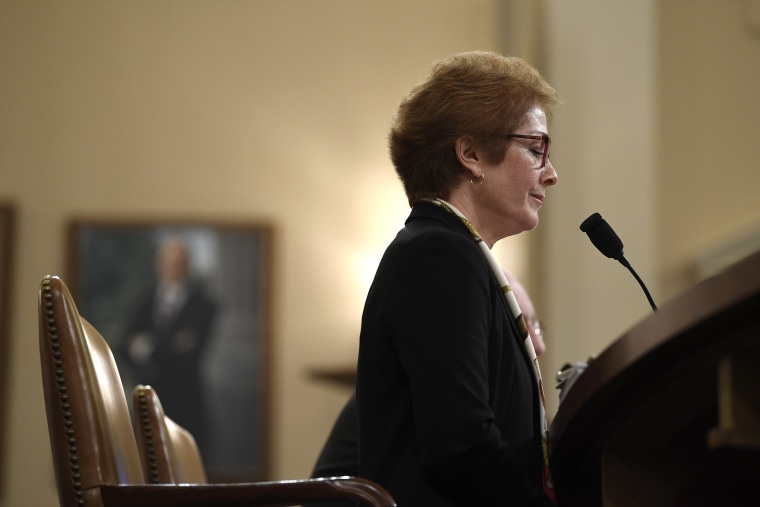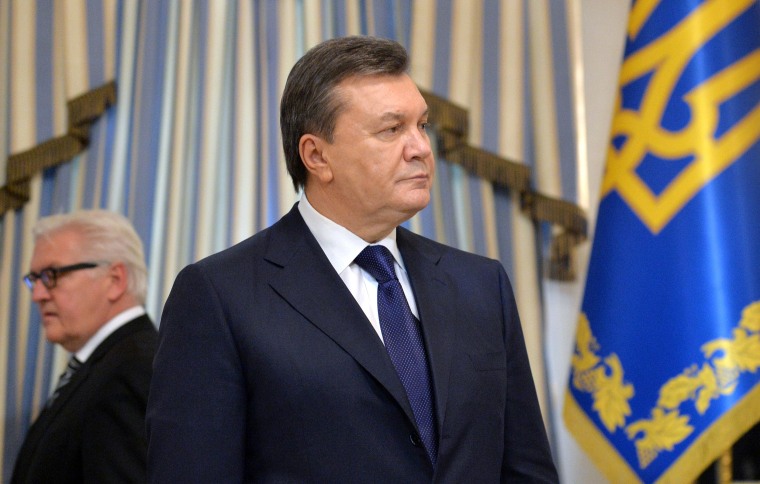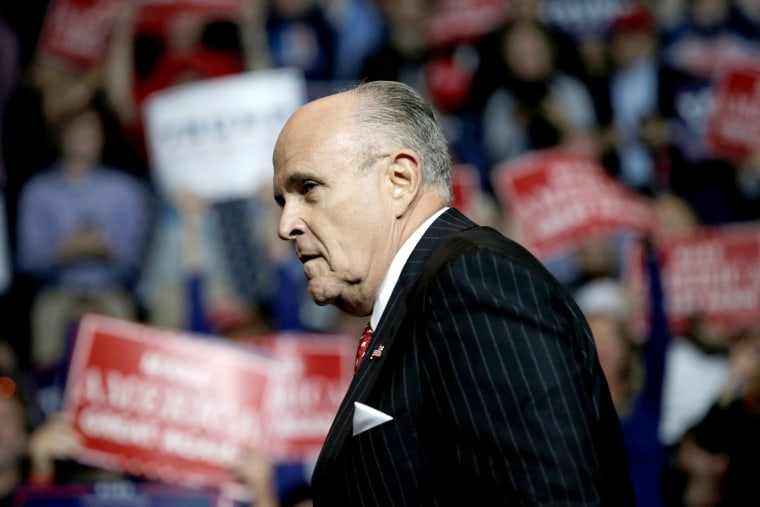WASHINGTON — Even as President Donald Trump awaits a trial in the Senate, his personal attorney Rudy Giuliani is moving full speed ahead with new allegations against former Vice President Joe Biden and the former ambassador to Ukraine, Marie Yovanovitch, the very individuals targeted by Trump in events that triggered his impeachment.
In recent weeks, Giuliani — himself under federal investigation for his Ukraine activities — has cryptically teased what he calls new “proof” buttressing charges about Biden and purported corruption during the Obama administration, attempting to flip the script by contending that Democrats, not the president, are the ones guilty of obstruction and collusion with a foreign power to influence elections.
The allegations point to four Ukrainian would-be whistleblowers he says Yovanovitch silenced through visa denials, and include two multibillion-dollar schemes he says he’s uncovered and that Yovanovitch and the Obama administration conspired to cover up.
In tweets and interviews, the former New York City mayor has been intentionally vague about both the allegations and his newfound proof, while vowing to eventually reveal it to the Department of Justice and a trio of senators.
“All in good time,” Giuliani told NBC News via text message when asked when he’d produce the evidence.
But documents obtained by NBC News, interviews with people familiar with Giuliani’s activities and a review of his public comments show he’s relying almost entirely on assertions by Ukrainians whose credibility is questionable at best. In some cases, the allegations have already been thoroughly debunked.
Giuliani’s allegations have found a receptive audience in Trump, who says Giuliani will “make a report” to Attorney General William Barr about his “good information.” In the Senate, Judiciary Committee Chairman Lindsey Graham and two other Republican chairmen are seeking interviews with Ukrainians and Americans with purported knowledge about what Giuliani alleges.
That has created the prospect that even as the Senate holds a trial on whether to remove Trump from office, Senate Republicans could counter-program the trial by carrying out their own publicized probe into Biden and his son Hunter and alleged Ukrainian meddling in 2016.
Here's a look at what’s known and unknown about Giuliani’s new allegations:
$5.3 billion in squandered U.S. cash
Giuliani’s first allegation centers on $5.3 billion in U.S. taxpayer dollars he says were mishandled and even “laundered” during the Obama administration on Biden’s and Yovanovitch’s watch.
On Twitter, Giuliani cited documents from Ukrainian auditors he says show “much of the $5.3B in U.S. aid” was misused and “given to the embassy’s favored NGOs” — nongovernmental organizations. He says the U.S. Embassy “directed the police not to investigate.”

The United States has never given $5.3 billion to Ukraine. Even Israel, the largest recipient of U.S. assistance, has never received more than $3.8 billion in a given year.
A 2017 report from Ukraine’s Accounts Chamber, the parliamentary auditing agency, and reviewed by NBC News does mention $5.3 billion in U.S.-funded “international technical projects” during the last full year of the Obama administration but not all the money was from the United States. Although the report concludes the funding wasn’t well-directed toward Ukraine’s top economic priorities, there’s no suggestion of intentional misconduct and no reference to laundering.
Giuliani hasn’t explained his claim that the U.S. urged Ukraine’s police not to investigate. But his reference in the same tweet to “favored NGOs” offers a window into his emerging claim.
For months, Giuliani has alleged that an anti-corruption nonprofit in Ukraine called AntAc colluded with the Democratic Party to dig up dirt on former Trump campaign chairman Paul Manafort. AntAc received funding both from the U.S. and from a philanthropy founded by billionaire George Soros, a fact Giuliani’s associates have used to fuel conspiracy theories.
Download the NBC News app for full coverage of Trump's impeachment
Giuliani worked closely with John Solomon, a former columnist for The Hill newspaper, on articles about alleged Ukrainian election-meddling, including a column in March that said the U.S. Embassy pressured Ukraine to drop an investigation into AntAc.
The column included a letter from George Kent, then the No. 2 in the embassy, to the Ukrainian prosecutor’s office that said the U.S. was confident its money was being well spent on anti-corruption activities in Ukraine and that a probe into AntAc based on its receipt of U.S. funding was “misplaced.” At the time Kent sent the letter, Yovanovitch wasn’t yet the ambassador.
Kent, in his testimony in the impeachment hearings, said that the effort by the former Ukrainian Prosecutor General Yuriy Lutsenko, one of Giuliani’s key witnesses, to investigate AntAc was “completely without merit.”
$7.5 billion in laundered Ukrainian funds
Since his investigative trip to Ukraine and eastern Europe this month, Giuliani has been teasing a revelation he says is coming about another scheme, this one worth $7.5 billion.
It involves a claim that former Ukrainian President Viktor Yanukovych, who plundered the country's assets before being ousted, had laundered $7.5 billion through an elaborate conspiracy involving Franklin Templeton, a U.S. investment firm, which purchased Ukrainian bonds nearing that amount starting a decade ago. They were later sold.

No proof has been produced publicly. A Franklin Templeton spokeswoman said the allegations are “not logical and entirely false,” pointing out that the money went from the firm to Ukraine’s government — the exact opposite of what’s alleged.
The unproven allegations have been peddled for years by Lutsenko and more recently by Ukrainian lawmaker and former journalist Oleksandr Dubinsky. Giuliani met with both men while in Europe this month.
After his meeting with Giuliani in Kyiv, Dubinsky posted a video to social media in which he said he’d told Giuliani about the alleged scheme. A spokeswoman for Lutsenko told Ukrainian media he had also told Giuliani that Yovanovitch had blocked him from investigating the stolen funds.
“She was OBSTRUCTING JUSTICE and that’s not the only thing she was doing. She at minimum enabled Ukrainian collusion,” Giuliani wrote this month on Twitter.
Yovanovitch declined through an attorney to comment on Giuliani’s allegations. But the Franklin Templeton theory dovetails with Giuliani’s repeated assertions that Yovanovitch “perjured herself” in her impeachment testimony.
Lutsenko says when he was prosecutor general, Yovanovitch impeded his efforts to obtain Justice Department help in investigating money laundering and Yanukovych’s graft. Yovanovitch testified he wasn’t serious about those aims and just wanted high-profile meetings with the U.S. attorney general and the FBI director.
Yovanovitch testified she encouraged Lutsenko to meet with the FBI’s legal attaché at the embassy, the normal process for requesting law enforcement cooperation between countries, but that Lutsenko “didn’t want to share that information.”
Not so, Lutsenko said alongside Giuliani in an interview this month with One America News Network, the far-right television outlet that traveled with Giuliani to Ukraine. He held up a letter he sent in 2017 to the legal attaché about the Franklin Templeton allegations, as evidence that Yovanovitch perjured herself by saying he never contacted the attaché.
A former senior U.S. official said the letter in question was spurious and offered no proof that any of the money was in the U.S., and that because the legal attaché works for the Justice Department, it’s possible Yovanovitch wouldn’t have even known about it.
At the same time, Giuliani has been tweeting about connections between Franklin Templeton and House Intelligence Committee Chairman Adam Schiff, who ran the impeachment investigation.
Giuliani has echoed suggestions by Lutsenko that Schiff stood to benefit because he had a financial interest in Franklin Templeton. Schiff’s public financial disclosure shows he owns some of the firm’s mutual funds along with other various similar investments. There’s no evidence Schiff had any involvement in or knowledge of the firm’s purchase of Ukrainian bonds years ago.
Visas blocked for Ukrainian whistleblowers
Giuliani says he has four witnesses ready to testify that Yovanovitch “personally turned down their visas because they were going to come here and give evidence either against Biden or against the Democratic Party.” He said he also now has “documentary proof.”
It’s unclear why any of the individuals would need to travel to the U.S. to provide evidence about corruption, or whether Giuliani perhaps hoped to arrange meetings between them and Trump as he sought to deliver dirt about the president’s opponents.
Giuliani hasn’t disclosed a list of the four individuals or described the proof. But the likely list can be gleaned from other assertions he and his associates have made about Ukrainians unable to get visas to come to the U.S.
The first is former Prosecutor General Viktor Shokin, who preceded Lutsenko. Trump and Giuliani allege Biden bribed Ukraine with $1 billion in U.S. aid in 2016 to fire Shokin so as to shut down investigations into Burisma, the Ukrainian natural gas company whose board Hunter Biden joined.

While in Europe, Giuliani also interviewed Shokin, who told him and One America News that at Biden’s demand, former Ukrainian President Petro Poroshenko pressured him to wind down the investigation into Burisma. But it’s never been clear that Shokin was actively investigating Burisma in the first place, and critics say Shokin was in fact leveraging the threat of opening a Burisma investigation to solicit bribes.
Yovanovitch and other U.S. officials deposed in the impeachment inquiry testified that pushing Ukraine to replace Shokin was official U.S. policy, precisely because he was seen as failing to sufficiently investigate corruption.
Documents given to Giuliani by Ukrainian lawmaker Andriy Derkach and obtained by NBC News show Giuliani has also been absorbing allegations that under Yovanovitch, the U.S. Embassy was acting as a puppet master for Ukraine’s recently formed National Anti-Corruption Bureau, or NABU.
The documents circulated by Derkach, who was trained at a KGB school in Moscow, include emails between NABU officials and U.S. embassy officials in 2017. Derkach had said they show the NABU “leaked” information to the U.S. about ongoing criminal cases, including investigations into Mykola Zlochevsky, the Ukrainian oligarch who founded Burisma.
Giuliani has acknowledged that in January he tried and failed to get the Trump administration to grant Shokin a U.S. visa.
In her impeachment testimony, Yovanovitch says she didn’t block the visa for Shokin, but concurred when State Department consular officials suggested withholding a visa because of his “known corrupt activities.” She says she notified Washington of the decision and that senior State Department officials stood behind it even as Giuliani was pressuring the White House to overrule them.
Giuliani says that’s another example of perjury by Yovanovitch. He says he now has State Department records showing the reason stated for the denial was that Shokin had undergone an operation two years earlier “and hadn’t recovered yet.”
Giuliani didn’t explain that unusual claim, which would not normally preclude a visa, and hasn’t produced the records. But Yovanovitch in her testimony suggested Shokin had lied in his visa application by saying he was coming to visit family, not provide evidence about corruption, as he now claims.
A State Department spokeswoman didn’t respond to requests for comment about Shokin’s visa application or Giuliani’s claim.
A second Ukrainian likely on Giuliani’s list is Andriy Telizhenko, the former Ukrainian diplomat who says he witnessed the Ukrainian Embassy in Washington collude with the Democratic National Committee in 2016. Telizhenko traveled to Ukraine with Giuliani on his trip and told NBC News he now can’t return because his visa is being blocked by “Soros people” with influence over the U.S. Embassy.
A third Ukrainian who says his visa was blocked is Mykhaylo Okhendovsky, who chaired Ukraine’s Central Election Commission until the Parliament fired him last year.
In an interview alongside Giuliani, Okhendovsky told One America News that Kent, the former deputy under Yovanovitch at the U.S. Embassy, tried to block his visa. He said when he appealed to Yovanovitch, she brushed him off. Okhendovsky says while he now holds a U.S. visa, he’s been told it won’t be renewed once it expires.
The fourth Ukrainian appears to be Kostiantyn Kulyk, a former prosecutor who compiled a dossier about Hunter Biden. Giuliani says in a One America News segment that Kulyk made a formal application to come to the U.S. to divulge what he knows, but that the U.S. Embassy hasn’t responded.

